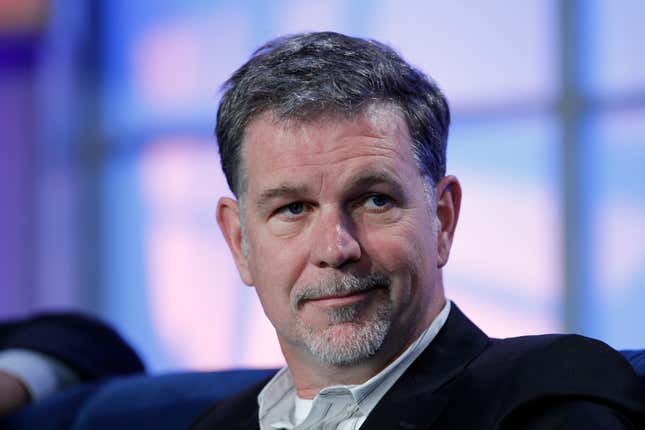
In their letter to shareholders yesterday, Netflix CEO Reed Hastings and CFO David Wells offered a frank and lucid assessment of the competition among streaming media services. Yes, of course, they think Netflix reigns supreme in that market, but it’s fascinating to see how they view their competitors.
“Hulu is currently our closest U.S. competitor,” write Hastings and Wells. After that, it’s Amazon, which Netflix sees as a distant threat in the US. In the UK, however, Netflix says it is only “modestly ahead” of Amazon.
Finally, and perhaps most interestingly, Netflix appears convinced that Time Warner will eventually sell HBO direct to consumers, which would pose a direct threat to Netflix. “That is our operating assumption,” say Hastings and Wells. That would be a big deal because, everywhere outside the Nordics, HBO is only sold through cable TV packages and can’t be purchased on its own—for now.
Here’s the relevant portion of the letter:
Another class of competitors is other low-cost, globally-ambitious Internet subscription services. The big four are Netflix, Hulu, Amazon, and HBO. We each have unique strategies to win share of consumers’ time and spending. Three of us are Internet firms with mostly licensed content, all getting into original content. One of us (HBO) is an original content firm getting into the Internet subscription business. It is possible that several of us of will be successful since some consumers will subscribe to multiple services, each of which has unique content.
Hulu operates in Japan and the U.S. and is a joint venture owned by News Corp., Disney, and Comcast. While there are now around 2 million Hulu Plus members in the U.S., the ownership of Hulu makes it a wild-card in terms of future evolution as a global competitor. We believe in terms of U.S. viewing, Hulu is currently our closest U.S. competitor. Hulu is investing in producing original content. Hulu has commercial interruptions in their paid and free service, unlike Netflix, Amazon and HBO.
Amazon is taking different strategies in the U.K. and the U.S. In the U.K., Amazon bought the LOVEFiLM DVD rental service early in 2011, presumably as a launch vehicle for streaming. For most of 2011, LOVEFiLM streaming was only available bundled with DVD rental and in late 2011, LOVEFiLM started offering a standalone streaming service. Netflix and Amazon LOVEFiLM now compete in the U.K. with similar price points. In the U.K., Amazon has Prime, but has not chosen to include streaming video as part of Prime. Our analysis of viewing and content says we are already modestly ahead in streaming viewing and content library, which we are very happy about given the large head-start LOVEFiLM had in the region. Our content is substantially distinct from LOVEFiLM’s content. We will keep investing in better content, and improving our member experience, which benefits from our global focus on streaming.
In the U.S., Amazon is bundling streaming with its Prime shipping service, instead of with DVD rental. The majority of our most popular content is unavailable on Amazon Prime Instant Video, per the discussion above in the Domestic Streaming Content section. Our members tell us they’d like more content, not less, so we feel good about our relative content offering. Amazon is investing in original exclusive content as well. Our estimate is that viewing of Amazon Prime Instant Video has yet to pass that of Hulu.
HBO is planning to launch a direct-to-consumer Internet subscription service in the Nordics, matching our low price point. This will be the first test of our relative strengths in stand-alone subscription videoon-demand. We think it will make strategic sense eventually for HBO to go direct-to-consumer in the U.S., and become more of a competitor to Netflix; so, that is our operating assumption, and we are looking forward to competing in the Nordics.
Since many consumers in that eventuality would subscribe to both HBO and Netflix, we would compete like any two networks today. Our content is distinct from their content. Today we think the U.S. viewing of HBO GO by HBO’s approximately 29 million domestic subscribers has yet to equal overall viewing of Hulu or Amazon Prime.
Hat tip to Peter Kafka of AllThingsD for flagging the interesting parts of this letter.



